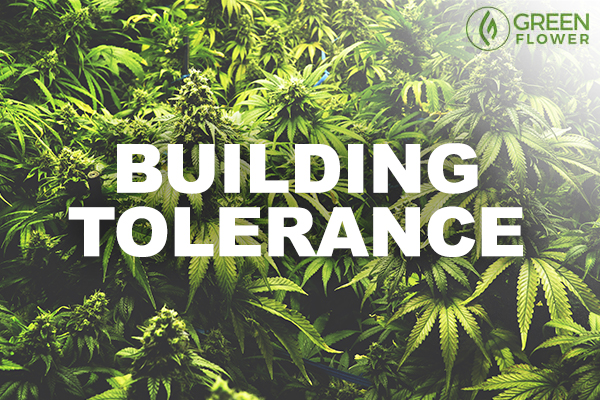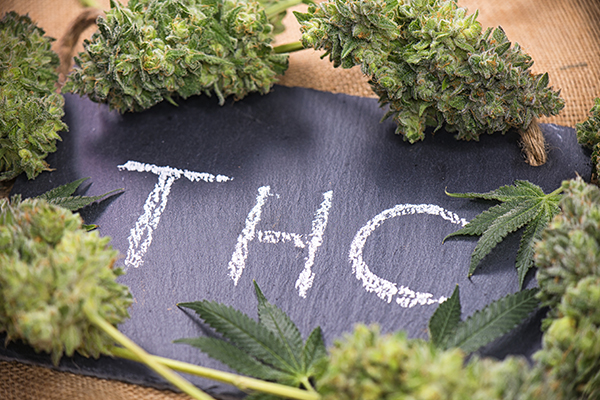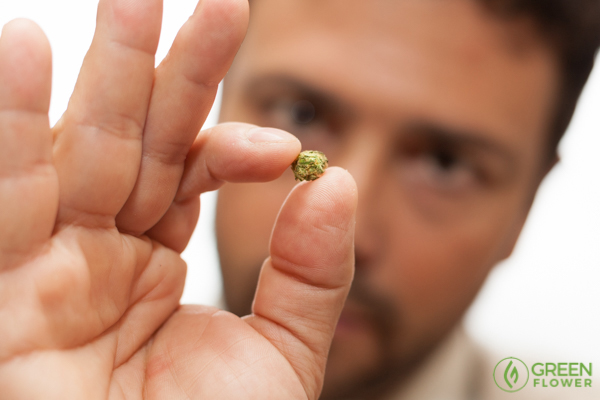
Cannabis tolerance is an ongoing factor for patients and consumers.
The development of cannabis tolerance is a well-documented phenomenon.
Simply stated, tolerance refers to the body’s ability to grow accustomed to the chemical effects of cannabis consumption.
If you continue to consume cannabis over time the body becomes used to the constant input and adjusts itself accordingly.
When you first begin to consume cannabis, you may find that the effects of the herb are quite strong.
With regular consumption, however, these strong effects mellow out and some of the negative side effects of the herb dissipate.
This is very similar to what happens in the body after you begin drinking coffee. Your first cup of coffee might make you feel jittery, anxious, dehydrated, and can give you an upset stomach.
Over time, however, the body grows used to the continuous input of caffeine.
You may still feel the energizing and stimulating effects of coffee after years of drinking the beverage, but you likely won’t feel as much of the anxiety and jitteriness that first-time consumers experience.
If you drink one too many cups on a given day, however, the anxiety and jitters can return.
The same thing happens with psychoactive cannabis. At first, the effects are strong. They become tolerable with continued consumption, and then they once again become uncomfortable with too high of a dose.
The negative side effects of tetrahydrocannabinol (THC)

Are you using more THC than you need? Or not enough?
One simple molecule is responsible for the psychotropic “high” caused by cannabis. That molecule is tetrahydrocannabinol (THC).
THC often gets a bad rap in mainstream media, but the molecule has a host of both scientifically proven and subjective health benefits.
However, just like a fine wine or beer, THC is an acquired taste. When you first try psychoactive cannabis, THC can have some potent side effects on the brain and body.
Some of these side effects include:
- Increased heart rate
- Anxiety
- Racing thoughts
- Lowered blood pressure
- Sedation
- Feeling cold
- Tremor
None of these side effects sound pleasant. So, why is cannabis so popular? Over time, consumers are better able to tolerate THC and these side effects go away.
They will come back again if your dose of psychoactive cannabis is too high. It’s also important to note not everyone will experience these side effects their first time consuming cannabis.
Many people reap the positive benefits of the herb the first time they try it. The positive benefits include euphoria, relaxation, happiness, pain relief, and stress relief.
Whether or not you experience negative side effects of THC depends largely on your initial dose, environment, and individual biochemistry.
It’s important to keep in mind that side effects are common when starting any sort of supplement. When starting a course of probiotics, for example, it is always recommended to start with a small dose and work up to therapeutic levels.
If you take a large dose right away, chances are you’ll end up gassy, bloated, and in pain.
Is cannabis tolerance good or bad?
Cannabis tolerance can be both beneficial and irritating.
For medical cannabis consumers, developing a tolerance to THC allows them to take the high doses of the herb that may be required for their treatment.
Tolerance also allows consumers taking small doses of THC for general wellness benefits (perhaps five milligrams of THC and under) to quickly grow accustomed to having the cannabinoid in their system.
While five milligrams may be enough to cause a psychoactive effect in novice consumers, those who take this dose regularly may not have much of a psychotropic experience at this dose, if any at all.
This effect may be sought after and beneficial in some people.
However, tolerance also has a downside. Tolerance to THC happens rather quickly.
Even daily cannabis consumers continue to feel the calming and euphoric effects of THC after a puff or two of a pre-roll (joint).
Yet, as consumers grow tolerant to the effects of cannabis, they may find that they need to continuously increase their dose over time in order to feel the same mood-boosting and pain-relieving effects of the herb as they did in the beginning.
It’s important to keep in mind that tolerance does not mean that you’ll have to consume a whole ounce of cannabis a day just to feel something.
Rather, cannabis tolerance can be compared to those who need one cup of coffee a day to get going versus those who need two or three.
Those who need two cups of coffee to feel energized in the morning have to deal with the side effect of dehydration more than those who need only one.
Similarly, those who need to vaporize a full gram of cannabis instead of just half a gram or less end up spending more money on the herb and will likely face greater symptoms of withdrawal should they stop.
Symptoms of cannabis withdrawal include headache, fatigue, difficulty sleeping, and irritability.
How to avoid getting a cannabis tolerance

Don’t underestimate the health benefits of low-dose cannabis.
Those using cannabis to treat a medical condition should consult a canna-savvy doctor about whether or not developing a tolerance would be beneficial for their particular situation.
However, for the average consumer, there are a few ways to both lower your cannabis tolerance or avoid getting one in the first place. Here are a few ways to hack your cannabis tolerance:
- Micro or low-dose cannabis
Microdosing cannabis is opting for very small doses of cannabis over large quantities. Generally speaking, a microdose of psychoactive cannabis is about 2.5 milligrams of THC.
Some folks chose to opt for low-dose cannabis instead of a micro-dose. An estimated low dose of cannabis is about five milligrams of THC. If inhaling, one small puff of cannabis can be seen as a low dose.
- Alternate days
THC is fat-soluble and is stored in body fat. This means that THC has a long half-life and can stay in your system for quite some time. Half-life refers to the amount of time a compound is active in the body to decrease by half.
Since THC has a long half-life, it may not be necessary to consume the cannabinoid every single day. To avoid developing a cannabis tolerance, consider staggering the days that you consume the herb.
- Take breaks
If you have been consuming the herb regularly, it may be time to take what is referred to as a “tolerance break”. A tolerance break is a period of abstinence from the plant.
The more heavily you consume cannabis, the more likely you are to experience symptoms of withdrawal during a tolerance break. If this is problematic, consider slowly lowering your doses of cannabis over time.
Opting for non-psychotropic cannabis varieties may also be beneficial during tolerance breaks. Cannabis cultivars high in cannabidiol (CBD) do not cause a euphoric “high.” However, high-CBD cultivars can still provide mood-boosting and calming effects.
– This article was originally posted at Green Flower
About CBDWire
CBDWire (CBDW) is an information service that provides (1) access to our news aggregation and syndication servers, (2) CBDNewsBreaks that summarize corporate news and information, (3) enhanced press release services, (4) social media distribution and optimization services, and (5) a full array of corporate communication solutions. As a multifaceted financial news and content distribution company with an extensive team of contributing journalists and writers, CBDW is uniquely positioned to best serve private and public companies that desire to reach a wide audience of investors, consumers, journalists and the general public. CBDW has an ever-growing distribution network of more than 5,000 key syndication outlets across the country. By cutting through the overload of information in today’s market, CBDW brings its clients unparalleled visibility, recognition and brand awareness. CBDW is where news, content and information converge.
To receive instant SMS alerts, text CBDWire to 21000 (U.S. Mobile Phones Only)
For more information please visit https://www.cbdwire.com
Please see full terms of use and disclaimers on the CBDWire website applicable to all content provided by CBDW, wherever published or re-published: https://CBDWire.com/Disclaimer
Do you have a questions or are you interested in working with CBDW? Ask our Editor
CBDWire (CBDW)
Denver, Colorado
cbdwire.com
303.498.7722 Office
Editor@CBDWire.com
This article contains Third-Party Content submitted by third parties, including articles submitted through the CBDW Premium Partnership Program. All opinions, statements and representations expressed by such third parties are theirs alone and do not express or represent the views and opinions of CBDW or its affiliates and owners. Content created by third parties is the sole responsibility of such third parties, and CBDW does not endorse, guarantee or make representations concerning the accuracy and completeness of all third-party content. You acknowledge that by CBDW providing you with this internet portal that makes accessible to you the ability to view third-party content through the CBDW site, CBDW does not undertake any obligation to you as a reader of such content or assume any liability relating to such third-party content. CBDW expressly disclaims liability relating to such third-party content. CBDW and its members, affiliates, successors, assigns, officers, directors, and partners assume no responsibility or liability that may arise from the third-party content, including, but not limited to, responsibility or liability for claims for defamation, libel, slander, infringement, invasion of privacy and publicity rights, fraud, or misrepresentation, or an private right of action under the federal securities laws of the United States or common law. Notwithstanding the foregoing, CBDW reserves the right to remove third-party content at any time in its sole discretion.







